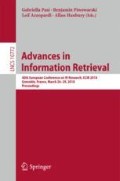Abstract
Nowadays, a series of pioneering studies provide the evidence that quantum probability theory can be applied in information retrieval as a mathematical framework, such as Quantum Language Model (QLM) and its variants. In these studies, the density matrix, which is defined on the quantum probabilistic space, is used to represent query and document. However, these studies are only designed for information retrieval tasks, which are unable to model sentiment information. In this paper, we investigate the feasibility of quantum probability theory for twitter sentiment analysis, and propose a density matrix based unsupervised sentiment analysis approach. The main idea is to artificially create two sentiment dictionaries, generate density matrices of documents and dictionaries using an extended QLM, then employ the quantum relative entropy to judge the similarity between density matrices of documents and dictionaries. Extensive experiments are conducted on two widely used twitter datasets, which are the Obama-McCain Debate (OMD) dataset and Sentiment Strength Twitter Dataset (SS-Tweet). The experimental results show that our approach significantly outperforms a number of baselines, demonstrating the effectiveness of the proposed density matrix based sentiment analysis approach.
Access this chapter
Tax calculation will be finalised at checkout
Purchases are for personal use only
References
Giachanou, A., Crestani, F.: Like it or not: a survey of twitter sentiment analysis methods. ACM Comput. Surv. (CSUR) 49(2), 28 (2016)
Pang, B., Lee, L.: Opinion mining and sentiment analysis. Found. Trends Inf. Retr. 2(1–2), 1–135 (2008)
Rosenthal, S., Farra, N., Nakov, P.: Semeval-2017 task 4: sentiment analysis in twitter. In: Proceedings of the 11th International Workshop on Semantic Evaluation (SemEval-2017), pp. 502–518. (2017)
Ghiassi, M., Skinner, J., Zimbra, D.: Twitter brand sentiment analysis: a hybrid system using n-gram analysis and dynamic artificial neural network. Expert Syst. Appl. 40(16), 6266–6282 (2013)
Agarwal, A., Xie, B., Vovsha, I., Rambow, O., Passonneau, R.: Sentiment analysis of twitter data. In: Proceedings of the Workshop on Languages in Social Media, pp. 30–38. Association for Computational Linguistics (2011)
Lee, S., Jin, X., Kim, W.: Sentiment classification for unlabeled dataset using doc2vec with jst. In: Proceedings of the 18th Annual International Conference on Electronic Commerce: e-Commerce in Smart connected World, p. 28. ACM (2016)
Pang, B., Lee, L., Vaithyanathan, S.: Thumbs up? Sentiment classification using machine learning techniques. In: Proceedings of Empirical Methods in Natural Language Processing, pp. 79–86 (2002)
Yin, Y., Jin, Z.: Document sentiment classification based on the word embedding (2015)
Giatsoglou, M., Vozalis, M.G., Diamantaras, K., Vakali, A., Sarigiannidis, G., Chatzisavvas, K.C.: Sentiment analysis leveraging emotions and word embeddings. Expert Syst. Appl. 69, 214–224 (2017)
Pham, D.H., Le, A.C.: Learning multiple layers of knowledge representation for aspect based sentiment analysis. Data Knowl. Eng. (2017)
Van Rijsbergen, C.J.: The Geometry of Information Retrieval. Cambridge University Press, Cambridge (2004)
Li, Q., Li, J., Zhang, P., Song, D.: Modeling multi-query retrieval tasks using density matrix transformation. In: Proceedings of the 38th International ACM SIGIR Conference on Research and Development in Information Retrieval, pp. 871–874. ACM (2015)
Sordoni, A., Nie, J.Y., Bengio, Y.: Modeling term dependencies with quantum language models for IR. In: Proceedings of the 36th International ACM SIGIR Conference on Research and Development in Information Retrieval, pp. 653–662. ACM (2013)
Li, J., Zhang, P., Song, D., Hou, Y.: An adaptive contextual quantum language model. Phys. A 456, 51–67 (2016)
Turney, P.D.: Thumbs up or thumbs down?: Semantic orientation applied to unsupervised classification of reviews. In: Proceedings of the 40th Annual Meeting on Association for Computational Linguistics, pp. 417–424. Association for Computational Linguistics (2002)
Turney, P.D.: Mining the web for synonyms: PMI-IR versus LSA on TOEFL. In: De Raedt, L., Flach, P. (eds.) ECML 2001. LNCS (LNAI), vol. 2167, pp. 491–502. Springer, Heidelberg (2001). https://doi.org/10.1007/3-540-44795-4_42
Goncalves, D.S., Gomes-Ruggiero, M.A., Lavor, C.: Global convergence of diluted iterations in maximum-likelihood quantum tomography. arXiv preprint arXiv:1306.3057 (2013)
Schumacher, B., Westmoreland, M.D.: Relative entropy in quantum information theory. Contemp. Math. 305, 265–290 (2002)
Pak, A., Paroubek, P.: Twitter as a corpus for sentiment analysis and opinion mining. In: LREc, vol. 10 (2010)
Kouloumpis, E., Wilson, T., Moore, J.D.: Twitter sentiment analysis: the good the bad and the omg!. ICWSM 11(164), 538–541 (2011)
Diakopoulos, N.A., Shamma, D.A.: Characterizing debate performance via aggregated twitter sentiment. In: Proceedings of the SIGCHI Conference on Human Factors in Computing Systems, pp. 1195–1198. ACM (2010)
Thelwall, M., Buckley, K., Paltoglou, G.: Sentiment strength detection for the social web. J. Assoc. Inf. Sci. Technol. 63(1), 163–173 (2012)
Le, Q.V., Mikolov, T.: Distributed representations of sentences and documents. Int. Conf. Mach. Learn. 4(2), 1188 (2014)
Thelwall, M., Buckley, K., Paltoglou, G., Cai, D., Kappas, A.: Sentiment strength detection in short informal text. J. Assoc. Inf. Sci. Technol. 61(12), 2544–2558 (2010)
Acknowledgements
This work is supported in part by the Chinese National Program on Key Basic Research Project (973 Program, grant No. 2014CB744604), Natural Science Foundation of China (grant No. U1636203, 61272265, 61402324), and the European Union’s Horizon 2020 research and innovation programme under the Marie Skłodowska-Curie grant agreement No 721321.
Author information
Authors and Affiliations
Corresponding author
Editor information
Editors and Affiliations
Rights and permissions
Copyright information
© 2018 Springer International Publishing AG, part of Springer Nature
About this paper
Cite this paper
Zhang, Y., Song, D., Li, X., Zhang, P. (2018). Unsupervised Sentiment Analysis of Twitter Posts Using Density Matrix Representation. In: Pasi, G., Piwowarski, B., Azzopardi, L., Hanbury, A. (eds) Advances in Information Retrieval. ECIR 2018. Lecture Notes in Computer Science(), vol 10772. Springer, Cham. https://doi.org/10.1007/978-3-319-76941-7_24
Download citation
DOI: https://doi.org/10.1007/978-3-319-76941-7_24
Published:
Publisher Name: Springer, Cham
Print ISBN: 978-3-319-76940-0
Online ISBN: 978-3-319-76941-7
eBook Packages: Computer ScienceComputer Science (R0)

